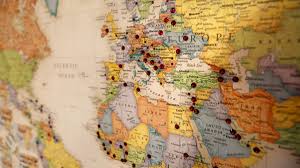In 2024, global geopolitical tensions are increasingly shaping the landscape of international news coverage. As geopolitical dynamics shift, media organizations face new challenges and opportunities in reporting global events. This article explores how ongoing geopolitical conflicts influence news coverage, the impact on media narratives, and the role of international journalism in navigating these complexities.
1. Geopolitical Conflicts and Media Narratives
1.1 Shifts in Focus and Coverage Priorities
Geopolitical tensions often lead to shifts in news coverage, as media organizations prioritize stories based on their geopolitical significance. In 2024, several key geopolitical conflicts are influencing international news coverage:
- Ukraine-Russia Conflict: The ongoing conflict between Ukraine and Russia continues to dominate headlines, with significant implications for international relations and security. News organizations worldwide closely follow the developments, including military actions, diplomatic negotiations, and humanitarian issues. The conflict’s high stakes and international ramifications ensure it remains a focal point in global news coverage.
- China-Taiwan Tensions: The tense relationship between China and Taiwan is another major geopolitical issue affecting news reporting. Media coverage often highlights military maneuvers, diplomatic exchanges, and economic implications of the tensions. The potential for escalation makes this issue a critical area of focus for international news organizations.
1.2 Influence on Media Narratives
Geopolitical tensions can shape media narratives in several ways:
- Framing and Bias: Media organizations may frame stories in ways that reflect their national interests or political affiliations. For example, coverage of conflicts may emphasize different aspects depending on the media outlet’s location and audience. This framing can affect public perception and influence the international narrative surrounding geopolitical events.
- Access and Reporting Challenges: Journalists covering geopolitical conflicts often face significant challenges, including restricted access, safety concerns, and censorship. These factors can impact the accuracy and comprehensiveness of news reporting. In some cases, journalists may rely on official sources or remote reporting, which can limit the depth of coverage.
2. The Role of International Journalism
2.1 Ensuring Balanced Reporting
International journalism plays a crucial role in providing balanced and comprehensive coverage of global events:
- Diverse Perspectives: To offer a balanced view, international news organizations often seek perspectives from multiple sources, including local journalists, experts, and affected individuals. This approach helps counteract biases and provides a more nuanced understanding of complex geopolitical issues.
- Cross-Border Collaboration: Collaboration between international news organizations can enhance coverage by pooling resources, sharing information, and coordinating reporting efforts. This collaboration can improve the accuracy and depth of reporting, particularly in regions with limited press freedom.
2.2 Addressing Misinformation and Propaganda
Geopolitical tensions often give rise to misinformation and propaganda, which can skew public perception:
- Fact-Checking and Verification: International news organizations are increasingly investing in fact-checking and verification to combat misinformation. Tools and techniques such as AI-powered verification, source analysis, and cross-referencing are used to ensure the accuracy of reported information.
- Educational Initiatives: Media literacy programs and public education initiatives aim to help audiences critically evaluate news sources and identify misinformation. By promoting media literacy, international journalism can empower readers to make informed judgments about the information they consume.
3. The Impact on Global News Consumption
3.1 Changing News Consumption Patterns
Geopolitical tensions are influencing how audiences consume and engage with news:
- Digital Platforms: The rise of digital platforms and social media has transformed news consumption patterns. Audiences increasingly access news through online channels, which can amplify the reach of geopolitical stories. However, this also raises concerns about the spread of misinformation and the need for reliable sources.
- Interactive and Visual Storytelling: To engage audiences and convey complex geopolitical issues, news organizations are using interactive and visual storytelling techniques. Infographics, data visualizations, and interactive maps help audiences better understand the context and implications of global events.
3.2 The Role of Public Perception
Public perception of geopolitical events is shaped by news coverage and media narratives:
- Influence on Policy and Opinion: News coverage can influence public opinion and policymaking. Geopolitical stories that resonate with audiences may lead to increased public awareness and pressure on governments and international organizations to take action.
- Trust in Media: The credibility of news organizations is crucial in shaping public perception. Trust in media sources can be affected by perceived biases, misinformation, and reporting quality. Maintaining high journalistic standards and transparency is essential for fostering trust and ensuring that news coverage remains credible.
Conclusion
In 2024, global geopolitical tensions have a profound impact on international news coverage, influencing media narratives, reporting practices, and audience engagement. As geopolitical conflicts continue to shape the global landscape, news organizations must navigate challenges such as bias, access restrictions, and misinformation. By providing balanced and comprehensive coverage, collaborating across borders, and addressing the spread of misinformation, international journalism plays a critical role in informing the public and shaping global perceptions. The evolving dynamics of geopolitical reporting underscore the importance of high-quality journalism in a rapidly changing world.

